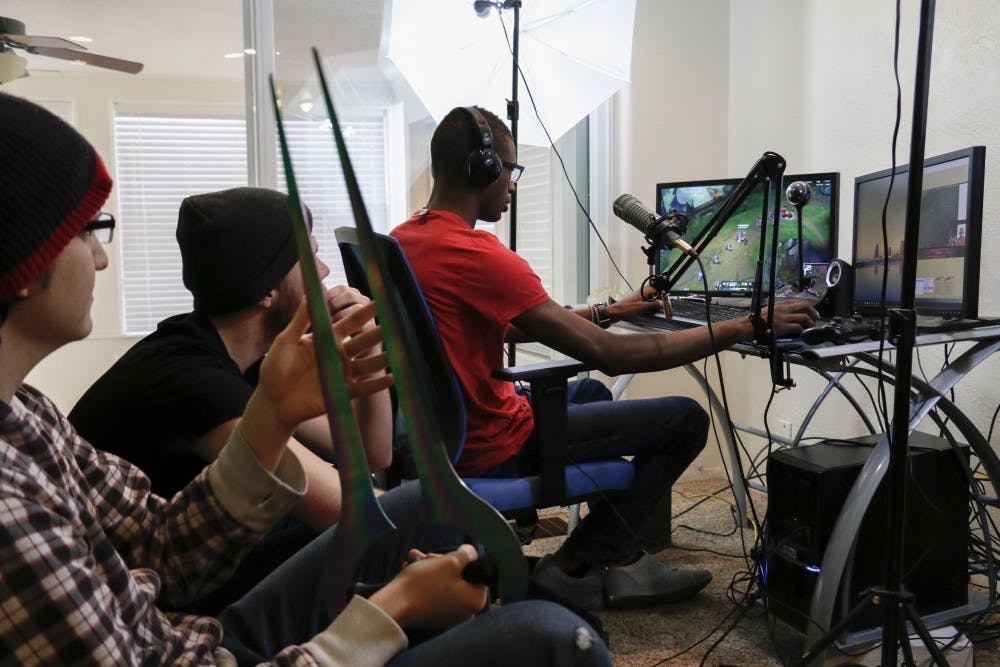Video games have always been a passion for Jason Montoya and Simon Kubiak.
The two longtime friends played video games on a regular basis growing up, and Montoya used to hold weekly tournaments at his parent’s house during high school. Those events got so big that eventually Montoya had to find an actual venue for hosting tourneys.
That love for video games has now led Montoya and Kubiak to start up Stream House ABQ, the idea of the company is to give gamers a chance to actually become professionals by livestreaming games and creating YouTube content while living in Stream House.
Montoya and Kubiak have a third business partner but he has decided to remain anonymous.
“Love of games is what’s really driven this adventure,” Kubiak said. “I think back to when I was the age of these content creators. I would’ve jumped at the opportunity to be part of something like this. I think Jason and I and our other investor are laying a foundation not only for Albuquerque but across the nation.”
Late in October, Stream House announced online that it would be accepting applications from potential members. Kubiak said they received about 40 applicants, ranging from ages 18 to 51. Applicants sent Stream House links to their past streams, as well as a roughly two-minute video describing their video game experience.
One of the main draws of Stream House is that gamers don’t have to pay rent. In fact, Stream House provides the games, consoles, lights and whatever else the content creators need to help them. Montoya and Kubiak have already spent thousands of dollars on equipment alone to get Stream House up and running.
Montoya and Kubiak spent weeks narrowing down the choices and in December chose three gamers: Zach Cordova, Billy Hargraves and Jason Denbigh. The three met each other at a dinner the founders held to get to know each other before moving into the Stream House in late December.
“These guys are the best of the best. I know some of the applicants don’t want to hear that,” Montoya said. “We have some who are salty and are upset with us. These guys are great. I know with a team like this we are going to achieve big things.”
The trio of Cordova, Hargraves and Denbigh have been passionate video gamers for most of their lives. Hargraves built his own gaming computer last year, Cordova has plenty of experience live streaming and Denbigh played Halo nonstop for years.
All three of them have to stream on Twitch, the most popular live streaming video platform in the world, for at least 21 hours a week. They get to pick the games they want to play, and all three of them are usually together when they stream.
“We got to this house and get to do this cool thing that wasn’t even possible,” Cordova said. “It’s a little culture shocking. It’s been an amazing experience thus far.”
Get content from The Daily Lobo delivered to your inbox
The gaming industry has become huge the past several years, particularly with eSports. According to Fortune, revenue for eSports is supposed to hit $463 million this year.
YouTube is another avenue for gamers to make some serious money. The most famous YouTube gamer in terms of subscribers is PewDiePie — whose real name is Felix Kjellberg— who raked in $12 million in 2014 from almost 40 million subscribers.
Montoya said Stream House has a two-year plan in order to become a sustainable business. Some of the ways they plan to get revenue are through donations, subscriptions, Twitch, YouTube content and advertisements. A GoFundMe campaign will be launched sometime in the coming months.
One of the main goals for Stream House is to become partnered with Twitch. In order to become a partner with Twitch, one must average a concurrent viewership of 500 or more, broadcast at least three times a week and the content must conform to Twitch’s terms of services and Digital Millennium Copyright Act guidelines.
“How are we doing this? We’re not borrowing money from banks or lending institutions or even private investment capital,” Kubiak said. “We’re self-funding this right now.”
This isn’t the first time Kubiak and Montoya have tried to break into the gaming world. Before Stream House, the two Albuquerque natives created a company called the National Video Gamers Association (NVGA).
The NVGA hosted numerous tournaments in the early 2000s in Albuquerque and at one point was considered the national event for Soul Caliber 2, according to Montoya.
The reason why NVGA ended up failing, Montoya said, was because there wasn’t enough leverage in Albuquerque to become the city for gaming tournaments. Montoya also said the lack of a multi-million person community in Albuquerque prevented NVGA from becoming bigger.
“I have my worries, but luckily, with streaming, you can pull that money from outside the community,” Montoya said. “This is a cutting edge thing and I do think that if we do nurture it we can be the guy. Hopefully we won’t lose it to other people who are doing the same or similar things.”
Kubiak and Montoya said if they’re able to successfully merge content creators with the competitive scene, then they want stream houses to pop up all over the country.
The hope is that Stream House will become a franchise akin to major American sports like the NFL, NBA or MLB.
“They’ll be able to showcase their abilities versus their competitors against other cities,” Kubiak said. “If we can successfully do that, the sky is the limit for Stream House. That’s the ultimate goal: having multiple houses and communities and playing each other on a schedule.”
Thomas Romero-Salas is the culture editor for the Daily Lobo. He can be reached at culture@dailylobo.com or on Twitter @ThomasRomeroS.






